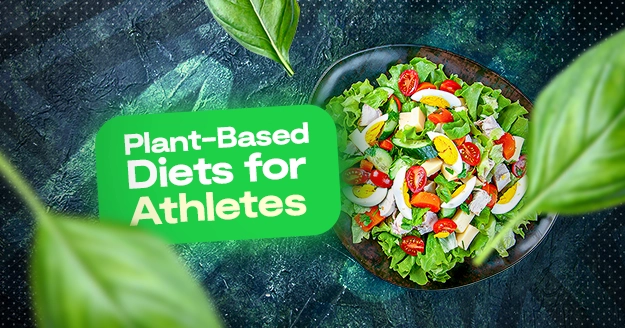What is a Plant-Based Diet?
Plant based nutrition or plant-forward dietary patterns prioritize foods that come predominantly from plants.
However, this doesn’t automatically imply that you adhere strictly to vegetarian or vegan diets and completely eliminate meat or dairy. Instead, it means making a conscious effort to include a higher proportion of plant-based foods in your overall food choices.
In fact, there are different types of plant based diets aside from vegetarian and vegan diets.
Variety of Plant-Based Diets
- Pescatarian
A pescatarian diet is plant based, with the addition of fish and seafood, excluding other meats. This flexible approach emphasizes fruits, vegetables, grains, and legumes while providing essential nutrients through fish, known for its omega-3 fatty acids and high-quality protein. Pescatarians enjoy health benefits and may choose this diet for its environmental considerations, favoring sustainable fishing practices.
- Flexitarian
The flexitarian diet is a flexible approach that prioritizes plant-based foods but still allows occasional intake of meat and other animal products. It offers the benefits of a plant-centric lifestyle with the flexibility to include meat based on personal preferences.
- Lacto-vegetarian
A lacto-vegetarian is a person who follows a vegetarian diet but includes dairy products in their food choices. This dietary pattern excludes meat, poultry, and fish, similar to a traditional vegetarian diet. However, lacto-vegetarians consume dairy products such as milk, cheese, yogurt, and butter, deriving essential nutrients like calcium and vitamin D from these sources. This diet provides a plant-based foundation while incorporating dairy for additional nutritional support.
- Ovo-vegetarian
An ovo-vegetarian is someone who follows a vegetarian diet but includes eggs in their food choices. Similar to other vegetarian diets, ovo-vegetarianism excludes meat, poultry, and fish. However, individuals adhering to an ovo-vegetarian diet consume eggs as a source of protein and other essential nutrients. This dietary pattern allows for a plant-based lifestyle while incorporating eggs for additional nutritional benefits.
What’s included in a plant-based athlete diet?
If you’re exploring plant based diet ideas, consider incorporating the following:
- Whole grains
Emphasizing the inclusion of whole grains in your diet is crucial due to their higher levels of vitamins, minerals, and fiber when compared to white or refined grain products. These options provide abundant carbohydrates, vitamins, minerals, and fiber, offering significant support for both intense physical activity and the recovery process.
- Legumes
Legumes, including lentils, peas, and beans, serve as excellent protein sources for athletes, supplying essential amino acids crucial for muscle building. Furthermore, legumes boast a significant fiber content, promoting not only digestive health but also sustained energy and a prolonged feeling of fullness.
- Plant-based proteins
Plant-based proteins can be excellent choices for athletes, providing the necessary nutrients for muscle development, recovery, and overall performance. Here are some notable sources of plant-based proteins suitable for athletes:
- Quinoa: This food contains all nine essential amino acids. It’s versatile. You can use them in salads, bowls, or as a side dish.
- Tofu and Tempeh: These soy-based products are high in protein and can be used in various dishes, such as sandwiches, stir-fries, or salads.
- Plant-Based Protein Powders: Pea protein, rice protein, hemp protein, and soy protein powders are available as supplements. These can be easily incorporated into smoothies and shakes or used in baking.
- Soy Products: Apart from tofu, soy milk, and soy-based yogurt are additional options rich in protein.
- Nuts and seeds
Almonds, chia seeds, peanuts, pumpkin seeds, and hemp seeds are rich in protein, healthy fats, and other nutrients. These foods aid in muscle repair, facilitating optimal post-workout recovery. They make excellent additions to smoothies and yogurt or can be consumed as snacks.
- Fruits and vegetables
Including fruits and vegetables in the diet is crucial for supplying vitamins, minerals, and antioxidants that support the recovery process in athletics. Dark, leafy green veggies are particularly valuable due to their abundant iron content. Additionally, excellent choices encompass sweet potatoes, berries, and citrus fruits.
- Fortified foods
Enriched foods like plant-based milk, breakfast cereals, and nutritional yeast can supply extra nutrients that might be deficient in the diet of a vegan athlete.
- Supplements
Although it’s important for a vegan athlete’s diet to incorporate nutrient-rich foods, supplements may be essential to address any nutritional deficiencies. Additionally, it might be advisable to explore a plant-based protein supplement, as obtaining a sufficient amount of “complete protein” from plant-based foods alone can be hard.
Benefits of Plant-Based Diets
- Enhanced Recovery and Reduced Inflammation
One of the standout benefits of plant-based diets for athletes lies in their ability to promote faster recovery and reduce inflammation. Whole plant foods are rich in antioxidants, which play a crucial role in combating oxidative stress caused by intense physical activity. By minimizing inflammation, athletes can recover more efficiently, allowing for consistent and sustained performance.
- Optimal Nutrient Intake
Plant-based diets provide a diverse array of essential nutrients, including minerals, vitamins, and fiber, which are vital for overall health and performance. Whole grains, legumes, fruits, and vegetables offer a spectrum of micronutrients that support energy metabolism, muscle function, and immune system health. Athletes can easily meet their nutritional needs through a well-balanced plant-based diet, ensuring they perform at their best.
- Improved Cardiovascular Health
Heart health is paramount for athletes, and adopting a plant-based diet has been linked to numerous cardiovascular benefits. Plant foods are low in cholesterol and saturated fats, promoting healthy blood flow and reducing the risk of cardiovascular diseases. A healthy heart means improved endurance and better oxygen delivery to working muscles, essential for athletes pushing their limits.
- Sustainable Energy
Plant-based diets are excellent sources of complex carbohydrates, providing athletes with sustainable energy for their demanding training sessions and competitions. Foods like whole grains, legumes, and fruits deliver a steady release of energy, preventing the highs and lows associated with refined sugars. This stable energy supply enhances endurance and supports optimal performance throughout prolonged physical activities.
- Lean and Efficient Muscle Mass
Contrary to the belief that animal products are necessary for building muscle, plant based diets can provide ample protein for athletes. Plant sources like legumes, tofu, tempeh, and quinoa offer high-quality protein without the saturated fats found in many animal products. Additionally, the anti-inflammatory properties of plant-based foods contribute to lean muscle mass development, fostering efficient and effective athletic performance.








